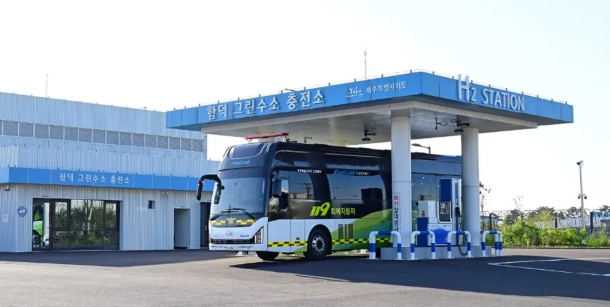
South Korea’s first commercial green hydrogen station opens in Jeju.
Renewable energy currently supplies about 20% of Jeju’s electricity, the highest in South Korea. However, surplus wind and solar power often strains the grid during peak production, leading to temporary shutdowns. To address this, Jeju is using green hydrogen as a storage solution to balance supply and demand. Governor Oh Young-hun emphasized: “Jeju, known for tourism, sees peak electricity demand in the evening when visitors and residents return home.” His administration aims to store excess renewable energy as green hydrogen for later use.
Jeju has been a pioneer in green hydrogen development. Through partnerships with the central government and private sector, the island operates a 3.3-megawatt hydrogen production facility that generates 600 kilograms of green hydrogen daily, supported by a 2-megawatt-hour battery storage system. The government targets a 30-megawatt production capacity by 2030 to strengthen its renewable energy framework.
To encourage hydrogen-powered transport, Jeju provides subsidies covering up to 50% of the cost of hydrogen fuel cell vehicles. In 2024, the island launched South Korea’s first commercial green hydrogen refueling station, with hydrogen priced at approximately $10 per kilogram, offering about 100 kilometers of driving range per kilogram. While this is more cost-effective than gasoline for some vehicles, it remains pricier than electric vehicle charging. Production costs currently exceed retail prices, but officials are committed to building a comprehensive hydrogen ecosystem.
Thomas Koller, from Energy Systems at DNV in the Asia-Pacific region, stated: “Green hydrogen can become more economically viable as technologies improve and production scales. When electricity is in oversupply and prices dip—or even go negative—green hydrogen becomes a highly attractive solution in the broader energy transition.”
Jeju’s government aims to position the island as a global leader in green hydrogen, fostering sustainable energy practices and maximizing its natural resources. By integrating hydrogen into its energy strategy, Jeju seeks to enhance renewable energy reliability and support the island’s tourism-driven economy while contributing to a cleaner energy future.